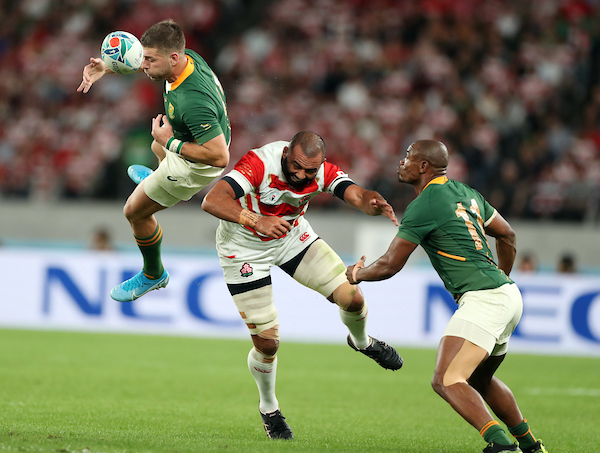There are a number of technicalities that the Springboks need to be very cautious of when taking on Wales this Sunday, writes former Bok hooker JAMES DALTON.
It may not have been as significant a scoreline as Springbok supporters were wanting and expecting, but nevertheless, the Boks are through to the semi-finals. That’s the good news. That said, there are a number of technicalities that need addressing when taking on Wales this Sunday, before hopefully playing in a final against either England or New Zealand.
The Springboks’ statistics against Japan represent a style of play that would not have them beat a tier-one nation. They made the same running metres as Japan (295m to 274m) but beat five fewer defenders (15 to 20), had 10 fewer gainline successes (25 to 35), made a worryingly low two offloads to Japan’s 12 and both made and missed more tackles. What these stats speak to, regardless of the final outcome of the game, is a team that is finding itself stagnant on attack and forced to defend.
Against New Zealand or England, there is no way this will be sustainable for 80 minutes.
I’ve stressed through the entire World Cup that the Springboks’ biggest weakness has been their inability to keep the ball alive. The contrast between their stagnant style of play and the All Blacks-type of offloading game was most evident this past weekend, as the ABs blew the Irish away with an unbelievable attacking, passing and offloading display. The Springboks, though, struggled to convert clear physical dominance over Japan into points, with the ball once again stagnating in the centres.
While Damian De Allende wasn’t bad, I think Frans Steyn’s versatility is what is needed to spark that style of play among the backs. This is due to his unpredictability – because he is equally capable of tucking the ball under his arm and flattening the opposition – as he does when it comes to swinging it wide or putting through a kick.
On the subject of backline positions: Willie le Roux needs to go.
He was shocking on Saturday, as he has been for most of the World Cup.
I’ve said it before, but he’s lost the flair that someone like Damian Willemse or Cheslin Kolbe possesses so clearly and he has not been strong as a last line of defence.
I was also as baffled by Faf de Klerk’s Man of the Match award against Japan as I continue to be flummoxed by his box kicks that are never (or seldom) won back. The trend has remained throughout the World Cup and one has to assume that he is instructed to hoof them up randomly, and hasn’t been making these decisions himself. That said, he put in a much-improved performance against Japan compared to his pool-stage displays.
The Springbok forwards were brilliant, as they have been consistently. They were clinical at the lineouts and showed the forgotten value of a big left-shoulder scrum, which led to Makozole Mapimpi’s first try. The wing was also superb over the weekend and compensates for any defensive weakness with his brilliant finishing.
So, yes, there are a few areas that seem to have remained unaddressed during the Boks’ campaign, namely the lack of offloading and the persistence of box kicks.
One has to trust that Rassie has a plan, and that South Africa will be able to deploy their traditional strengths well against the tier-one nations without being neutralised.
ALSO READ: Boks get Garces again
Photo: Steve Haag Sports via Hollywoodbets






